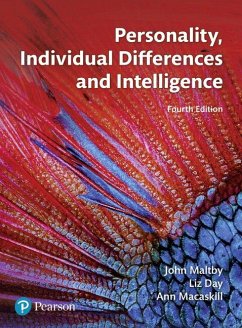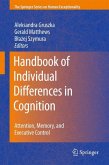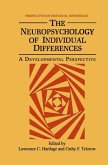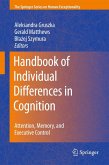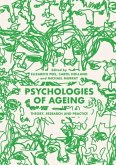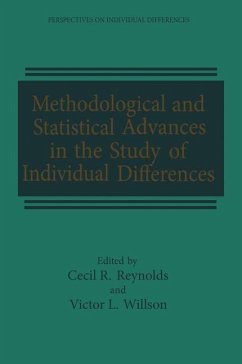- Broschiertes Buch
- Merkliste
- Auf die Merkliste
- Bewerten Bewerten
- Teilen
- Produkt teilen
- Produkterinnerung
- Produkterinnerung
A comprehensive and accessible fourth edition of a market leading text on personality, individual differences and intelligence that offers up-to-date research and a wealth of pedagogical features.
Andere Kunden interessierten sich auch für
![Handbook of Individual Differences in Cognition Handbook of Individual Differences in Cognition]() Handbook of Individual Differences in Cognition63,99 €
Handbook of Individual Differences in Cognition63,99 €![Key Thinkers in Individual Differences Key Thinkers in Individual Differences]() Alex ForsytheKey Thinkers in Individual Differences174,99 €
Alex ForsytheKey Thinkers in Individual Differences174,99 €![The Neuropsychology of Individual Differences The Neuropsychology of Individual Differences]() Lawrence C. Hartlage / Cathy F. Telzrow (Hgg.)The Neuropsychology of Individual Differences81,99 €
Lawrence C. Hartlage / Cathy F. Telzrow (Hgg.)The Neuropsychology of Individual Differences81,99 €![Handbook of Individual Differences in Cognition Handbook of Individual Differences in Cognition]() Aleksandra Gruszka / Gerald Matthews / Blazej Szymura (Hrsg.)Handbook of Individual Differences in Cognition155,99 €
Aleksandra Gruszka / Gerald Matthews / Blazej Szymura (Hrsg.)Handbook of Individual Differences in Cognition155,99 €![The Contribution of Cognitive Psychology to the Study of Individual Cognitive Differences and Intelligence The Contribution of Cognitive Psychology to the Study of Individual Cognitive Differences and Intelligence]() The Contribution of Cognitive Psychology to the Study of Individual Cognitive Differences and Intelligence197,99 €
The Contribution of Cognitive Psychology to the Study of Individual Cognitive Differences and Intelligence197,99 €![Psychologies of Ageing Psychologies of Ageing]() Psychologies of Ageing93,99 €
Psychologies of Ageing93,99 €![Methodological and Statistical Advances in the Study of Individual Differences Methodological and Statistical Advances in the Study of Individual Differences]() Methodological and Statistical Advances in the Study of Individual Differences41,99 €
Methodological and Statistical Advances in the Study of Individual Differences41,99 €-
-
-
A comprehensive and accessible fourth edition of a market leading text on personality, individual differences and intelligence that offers up-to-date research and a wealth of pedagogical features.
Produktdetails
- Produktdetails
- Verlag: Pearson Education
- 4th. ed.
- Seitenzahl: 784
- Erscheinungstermin: 22. März 2017
- Englisch
- Abmessung: 264mm x 195mm x 27mm
- Gewicht: 1444g
- ISBN-13: 9781292090511
- ISBN-10: 1292090510
- Artikelnr.: 48974051
- Herstellerkennzeichnung
- Pearson
- St.-Martin-Straße 82
- 81541 München
- salesde@pearson.com
- +4989541960460
- Verlag: Pearson Education
- 4th. ed.
- Seitenzahl: 784
- Erscheinungstermin: 22. März 2017
- Englisch
- Abmessung: 264mm x 195mm x 27mm
- Gewicht: 1444g
- ISBN-13: 9781292090511
- ISBN-10: 1292090510
- Artikelnr.: 48974051
- Herstellerkennzeichnung
- Pearson
- St.-Martin-Straße 82
- 81541 München
- salesde@pearson.com
- +4989541960460
Dr John Maltby is Associate Professor of Psychology at the University of Leicester. Dr Liz Day is Senior Lecturer in Psychology at the Sheffield Hallam University. Professor Ann Mackaskill is at Sheffield Hallam University. She is a Chartered Health Psychologist and trained in cognitive behavioural therapy.
PART 1 Personality
1 Personality Theory in Context
2 The Basis of the Psychoanalytic Approach to Personality
3 Developments of Freudian Theorising
4 Learning Theory Perspectives on Personality
5 Cognitive Personality Theories
6 Humanistic Personality Theories
7 The Trait Approach to Personality
8 Biological Basis of Personality I: Genetic Heritability of Personality
and Biological and Physiological Models of Personality
9 Biological Basis of Personality II: Evolutionary Psychology and Animal
Studies of Personality
PART 2 Intelligence
10 An Introduction to Intelligence
11 Theories and Measurement of Intelligence
12 The Use of Intelligence Tests: What Questions Emerge from the
Measurement of Intelligence?
13 Heritability and Socially Defined Race Differences in Intelligence
14 Intelligence and the Self: Emotional Intelligence, Creativity, and Sex
Differences in Intelligence.
15 The Application of Personality and Intelligence in Education and the
Workplace.
PART 3 Applications in Individual Differences
16 Optimism
17 Irrational Beliefs
18 Embarrassment, Shyness and Social Anxiety
19 Interpersonal Relationships
20 Social Attitudes and Culture
21 Well-being and Personality Disorders
22 Individual Differences in Health and Illness
23 An Introduction to Psychometric Testing
1 Personality Theory in Context
2 The Basis of the Psychoanalytic Approach to Personality
3 Developments of Freudian Theorising
4 Learning Theory Perspectives on Personality
5 Cognitive Personality Theories
6 Humanistic Personality Theories
7 The Trait Approach to Personality
8 Biological Basis of Personality I: Genetic Heritability of Personality
and Biological and Physiological Models of Personality
9 Biological Basis of Personality II: Evolutionary Psychology and Animal
Studies of Personality
PART 2 Intelligence
10 An Introduction to Intelligence
11 Theories and Measurement of Intelligence
12 The Use of Intelligence Tests: What Questions Emerge from the
Measurement of Intelligence?
13 Heritability and Socially Defined Race Differences in Intelligence
14 Intelligence and the Self: Emotional Intelligence, Creativity, and Sex
Differences in Intelligence.
15 The Application of Personality and Intelligence in Education and the
Workplace.
PART 3 Applications in Individual Differences
16 Optimism
17 Irrational Beliefs
18 Embarrassment, Shyness and Social Anxiety
19 Interpersonal Relationships
20 Social Attitudes and Culture
21 Well-being and Personality Disorders
22 Individual Differences in Health and Illness
23 An Introduction to Psychometric Testing
PART 1 Personality
1 Personality Theory in Context
2 The Basis of the Psychoanalytic Approach to Personality
3 Developments of Freudian Theorising
4 Learning Theory Perspectives on Personality
5 Cognitive Personality Theories
6 Humanistic Personality Theories
7 The Trait Approach to Personality
8 Biological Basis of Personality I: Genetic Heritability of Personality
and Biological and Physiological Models of Personality
9 Biological Basis of Personality II: Evolutionary Psychology and Animal
Studies of Personality
PART 2 Intelligence
10 An Introduction to Intelligence
11 Theories and Measurement of Intelligence
12 The Use of Intelligence Tests: What Questions Emerge from the
Measurement of Intelligence?
13 Heritability and Socially Defined Race Differences in Intelligence
14 Intelligence and the Self: Emotional Intelligence, Creativity, and Sex
Differences in Intelligence.
15 The Application of Personality and Intelligence in Education and the
Workplace.
PART 3 Applications in Individual Differences
16 Optimism
17 Irrational Beliefs
18 Embarrassment, Shyness and Social Anxiety
19 Interpersonal Relationships
20 Social Attitudes and Culture
21 Well-being and Personality Disorders
22 Individual Differences in Health and Illness
23 An Introduction to Psychometric Testing
1 Personality Theory in Context
2 The Basis of the Psychoanalytic Approach to Personality
3 Developments of Freudian Theorising
4 Learning Theory Perspectives on Personality
5 Cognitive Personality Theories
6 Humanistic Personality Theories
7 The Trait Approach to Personality
8 Biological Basis of Personality I: Genetic Heritability of Personality
and Biological and Physiological Models of Personality
9 Biological Basis of Personality II: Evolutionary Psychology and Animal
Studies of Personality
PART 2 Intelligence
10 An Introduction to Intelligence
11 Theories and Measurement of Intelligence
12 The Use of Intelligence Tests: What Questions Emerge from the
Measurement of Intelligence?
13 Heritability and Socially Defined Race Differences in Intelligence
14 Intelligence and the Self: Emotional Intelligence, Creativity, and Sex
Differences in Intelligence.
15 The Application of Personality and Intelligence in Education and the
Workplace.
PART 3 Applications in Individual Differences
16 Optimism
17 Irrational Beliefs
18 Embarrassment, Shyness and Social Anxiety
19 Interpersonal Relationships
20 Social Attitudes and Culture
21 Well-being and Personality Disorders
22 Individual Differences in Health and Illness
23 An Introduction to Psychometric Testing

